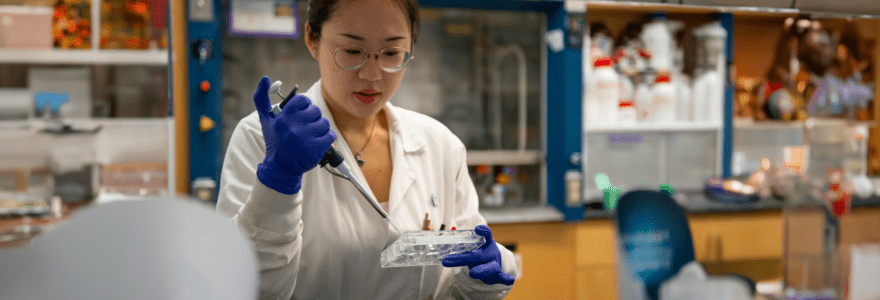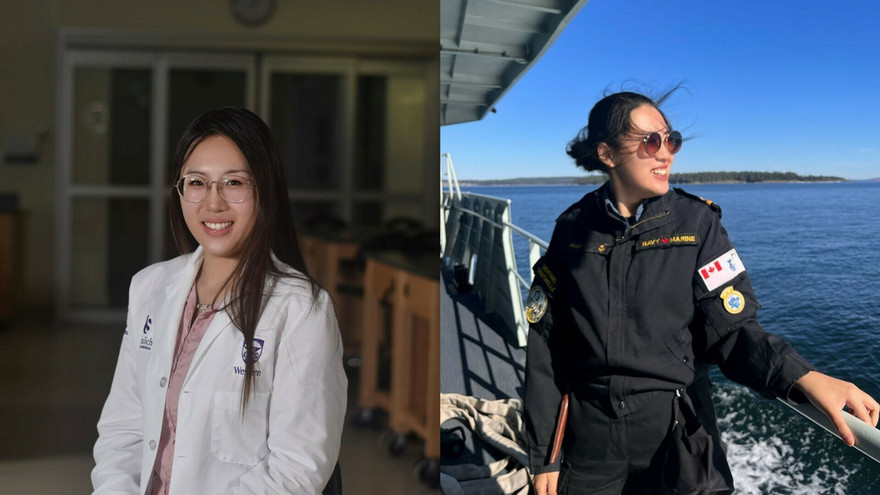Clinician-scientist candidate serves both patients and country with a smile

By Erika Pepe
Not many would pair military boots with a lab coat, but to Jennifer Guo, the unexpected combo makes perfect sense.
But then again, Guo is one of a kind in many ways.
At the age of 24, she’s a Naval Warfare Officer in the Royal Canadian Navy, and the only student in Canada studying in a program that will equip her to be both a dentist and a scientist. Guo is now in her third year of the Schulich Dental Clinician-Scientist (DCS) program.
The eight-year joint-degree curriculum provides students with a PhD and a Doctor of Dental Surgery degree and is designed to prepare graduates to develop innovative solutions for real-world clinical challenges. The program will enable Guo to address issues directly observed through first-hand patient interactions.
“Clinicians with a scientific mindset are critical in bridging the gap between clinical practice and laboratory research. They can identify clinical challenges and translate them into research questions, leading to new treatments, technologies and methodologies.”
Research could lead to new treatments for gum disease
Guo’s current research is focused on periodontal disease, a gum disease that infects the tissues that hold teeth in place. Specifically, she is looking at tissue regeneration.
This type of research could lead to new treatments, said her research supervisor, Douglas Hamilton, PhD, professor, Anatomy & Cell Biology and Schulich Dentistry.
It’s important on many levels. While studies have shown correlation of the disease with many serious conditions, such as diabetes and cardiovascular disease, Hamilton noted the psychological effect is also important to consider.
“If you’ve got damage to your teeth or if your gums have receded, you notice it instantly,” said Hamilton. “People can become self-conscious.”
Periodontal tissue is made up of gingiva tissue (the pinkish tissue that surrounds your teeth), the periodontal ligament (which attaches the teeth to bone), and the bone structure that holds the teeth in place. With periodontal disease, chronic infection degrades the tissue, eventually leading to the loss of teeth.
There are two major types of cells in the tissue: Gingival fibroblasts and periodontal ligament cells. Guo’s research focuses on regenerating this tissue, testing the effects of various growth factors on the two cell types.
Guo extracts cells from tissue collected from patients in the Schulich Dental Clinic. She grows the cells on the left and right side of a silicone insert in a cell culture dish. Guo then removes the insert, which creates a gap in the sheet of cells. By adding different growth factors in the dishes, she studies how they affect the rate of the gap closing.
By evaluating the effects of growth factors at the cellular level, she hopes to gain an understanding of the fundamental biological processes and potential mechanism of action for prospective treatments.
The parallels between naval training and scientific research
Guo finds working as a naval officer to be very similar to working with a research team.
“The essence of being a Naval Warfare Officer – analyzing complex situations under pressure to make prompt decisions – aligns closely with the rigors of scientific inquiry,” Guo said. “Strategic planning and effective problem-solving are directly translatable to formulating hypothesis, designing experiments, and ultimately tackling complex scientific problems.”

Her military training extends beyond tactical competency.
“As an officer, we receive extensive training on leadership and teamwork. These skills are also highly applicable in scientific and clinical settings, where collaborative projects are very common.”
Currently, Guo serves as a divisional officer at HMCS Prevost, Canadian Forces Naval Reserve Division in London, Ontario. Her responsibilities include administrative tasks and local training two evenings a week, and frequent travels across Canada for training and professional development during weekends.
And while Guo still has more than a year left before starting the dental school portion of her training, she’s prepared to embrace future challenges and hopes to inspire other people in the process.
“Don’t be afraid to dream big,” she said. “If other people can do it, you can do it, too.”








